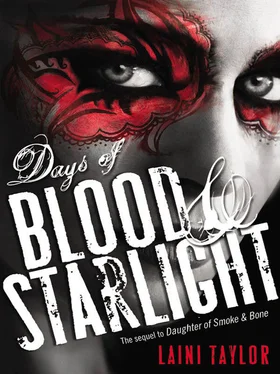What am I making?
And… What have I brought into the human world?
It was like surfacing from a dream to glimpse cold reality for just an instant before sleep dragged her back down. Karou’s horror subsided. She was arming soldiers, that’s what she was doing. If she didn’t, who would make the seraphim pay for what they’d done?
As for bringing them into the human world, this place was remote and forgotten; the chance of encountering people was slim to none. And if a small voice in her head liked to whisper, That’s not good enough, Karou , she was getting used to tuning it out.
She took a deep breath. All that remained now was to guide Amzallag’s soul into his new skin, and that was a simple matter for incense. She reached for a cone and turned back to Thiago. He had put his shirt back on, she was glad to see. He looked very tired, his eyes heavy-lidded, but he mustered a smile.
“All ready?” he asked her.
She nodded and lit the incense.
“Good girl.”
She bristled at the words and the caressing tone in which he spoke them. Am I? she wondered as she sank to her knees to raise the dead.
Coming up on the silent village, the slave caravan thought nothing of a sky winged by blood daubs. The anomaly would have been an absence of blood daubs; in this work, carrion birds were a given. Usually, however, the carrion was of the beast variety.
Not so now.
The dead were strung up on the aqueduct: eight seraphim with their wings fanned wide. From a distance, they seemed to be smiling. Up close, it was an ugliness to shock even a slaver. Their faces …
“What did this?” someone choked out, though the answer was writ plain before them. In sweeping letters, in blood, a message was painted on a keystone of the aqueduct.
From the ashes , it read, we are arisen .
They panicked and dispatched messengers for Astrae. Being ill-defended, they didn’t delay to cut down their soldiers but hurried on, driving their chimaera chattel with whips. A marked change had come over the captives at the sight of the dead—a brightness, a keen and shifting eagerness. The blood scrawl was not the only message; the smiles were a message, too.
The corners of the dead angels’ mouths had been carefully slit, widened into rictus grins. The slavers knew exactly what it meant and so did the slaves, and all eyes grew sharp—some with fear; others, anticipation.
Night came and the caravan made camp, posted guards. The dark was pocked by small sounds: a scurry, a snap. The guards’ hands were hot on their hilts; their blood jumped, eyes darted.
And then the slaves began to sing.
This had not happened on any previous night. The slavers were accustomed to whimpers from the huddle of captives, not song, and they didn’t like it. The beasts’ voices were raw as wounds, forceful and primal and unafraid. When the seraphim tried to silence them, a tail lashed forth from the huddle and knocked a guard off his feet.
And then, between one leap of the campfire’s flame and the next, they came. Nightmares. Saviors. They came from above , and the slavers’ first confused thought was that reinforcements had arrived, but these were no seraphim. Wings and screaming, spike horns, antlers, lashing tails and hunched ursine shoulders. Bristles, claws.
Swords and teeth.
No angel survived.
Freed slaves melted away into the landscape, dragging the swords and axes—and yes, the whips—of their captors. They would be less easily subdued in the future.
All fell still. Here, too, a message was scribed in the blood of slaughter—the same words as would be found at many such scenes in the days to come.
We are arisen , it read. It is your turn to die .
Once upon a time, an angel and a devil fell in love and dared to imagine a new way of living—one without massacres and torn throats and bonfires of the fallen, without revenants or bastard armies or children ripped from their mothers’ arms to take their turn in the killing and dying.
Once, the lovers lay entwined in the moon’s secret temple and dreamed of a world that was like a jewel box without a jewel—a paradise waiting for them to find it and fill it with their happiness.
***
This was not that world.
Akiva, Hazael, and Liraz walked among the dead angels. They didn’t speak, only looked, and their silence was brittle with anger. These corpses, they were torn , as mice by cats. Akiva couldn’t tell if he had known them—the blood daubs had done their work—but on several of the faces there remained enough flesh to make out the mutilation. The obscene smiles had not been seen for generations, but all seraphim and chimaera knew them from graven memory. This was the Warlord’s signature.
It was what he had done to his seraph masters when he rose up from slavery a thousand years ago and changed the world. It was a powerful and unmistakable symbol of rebellion.
“Harmony with the beasts,” said Liraz under her breath, and Akiva tensed. His words, thrown back at him, and what could he say in response? That these same soldiers had left a string of burned villages in their wake and were no one’s idea of innocent? It would sound as though he thought they deserved this. He didn’t, but he couldn’t feel outrage, either, only sinking sadness. These soldiers had done what they had done, and been done unto in return. This was how it went.
In the cycle of slaughter, reprisal begat reprisal, forever. Now was not the time to philosophize, though, not with blood daubs circling overhead, skawing at them to be gone and leave them to their feasts. He kept his thoughts to himself.
The sun was rising. It touched the stalks of jess with a fairy glimmer, and the tassels fanned like wings in the breeze. Green-gold, gold-green, not yet ripe and never now to ripen. Soldiers were touching fire to the field’s edge, and the flames would spread fast in this tinder heat. Before the sun was fully up, the jess would be crackling, and so would the slain. Fire take the dead. There were no funerals for soldiers.
A shout from above. “You there! What are you doing?”
Akiva tilted back his head. The rays of the early sun lit his amber eyes, and the seraph in the air saw who he was and blanched. “Forgive me, sir. I… I wasn’t informed that you were here.”
Akiva launched into the air to meet him, his brother and sister coming up behind him. “We’ve come with the reinforcements from Cape Armasin,” he said.
The largest garrison in the former free holdings, Cape Armasin had sent soldiers to bolster the small southern contingent in response to these attacks.
The young patrol leader, whose name was Noam, looked slightly dazed to find himself face-to-face with Beast’s Bane. “It’s good to have you, sir,” he said.
For the second time: sir . Liraz made a noise in her throat. Akiva was no sir. Though fame afforded him a certain esteem, he was Misbegotten, and his rank was as it had ever been, and would ever be: low. “What have you learned?” he asked.
The soldier was wide-eyed. “The fight was under the aqueduct, sir.” It stood just behind them, a massive, ancient span, trees enough sprouting from the cracks in its stones to make it a kind of aerial forest. It would have been built by seraphim, Akiva knew, in the early days of the Empire’s first expansion, many centuries gone by, when the angels had come to this wild land of primitive, hostile beast tribes and civilized it. Subdued it.
Subdued. What a gentle word for the slave-making and spirit-crushing that had brought the chimaera under the Empire’s fist. The Warlord had destroyed that fist, but it was back, and now Akiva was a part of it.
Читать дальше







![Лэйни Тейлор - Дочь дыма и костей [litres]](/books/415688/lejni-tejlor-doch-dyma-i-kostej-litres-thumb.webp)
![Лэйни Тейлор - Муза ночных кошмаров [litres]](/books/418520/lejni-tejlor-muza-nochnyh-koshmarov-litres-thumb.webp)
![Лэйни Тейлор - Мечтатель Стрэндж [litres]](/books/429127/lejni-tejlor-mechtatel-strendzh-litres-thumb.webp)


